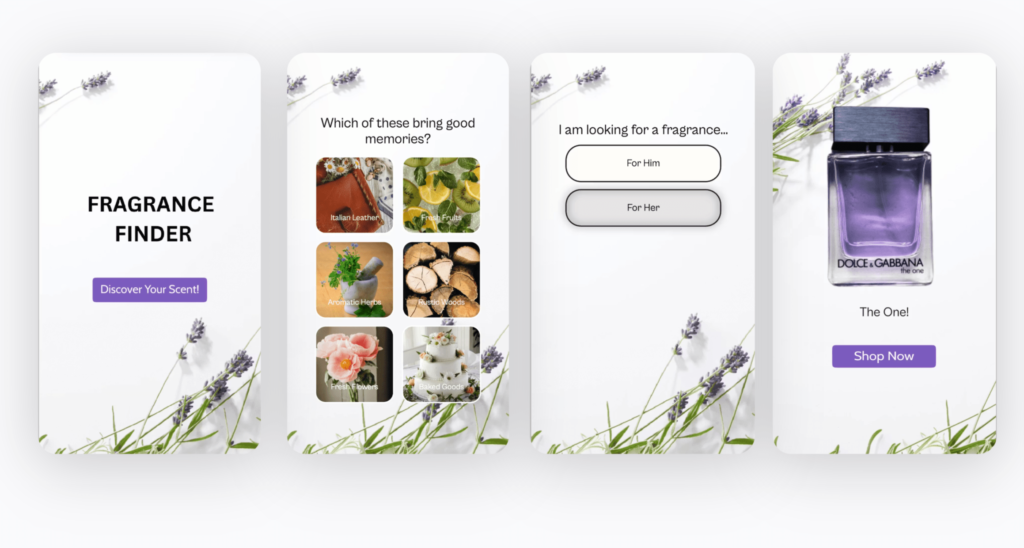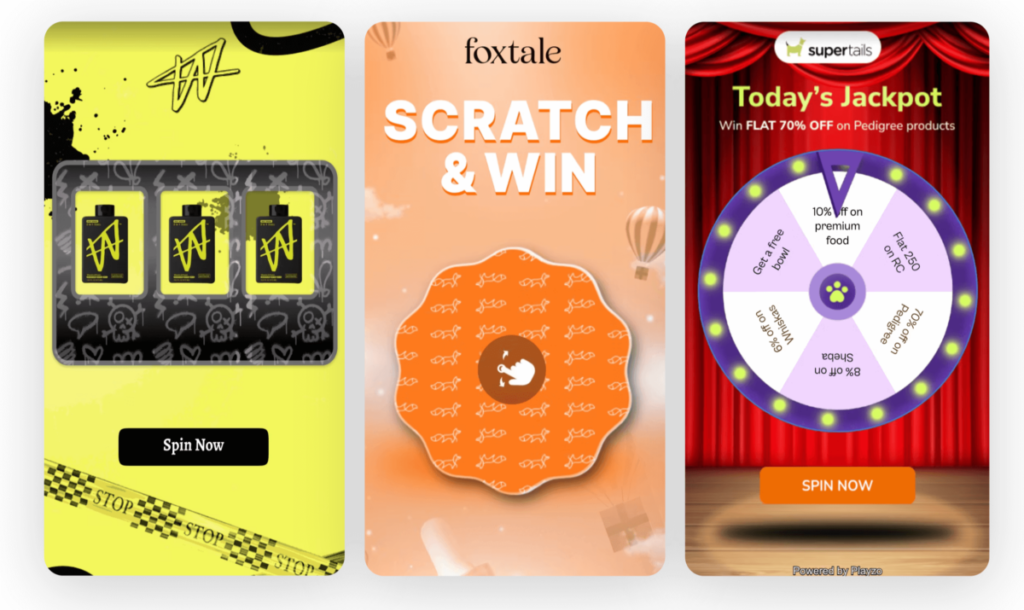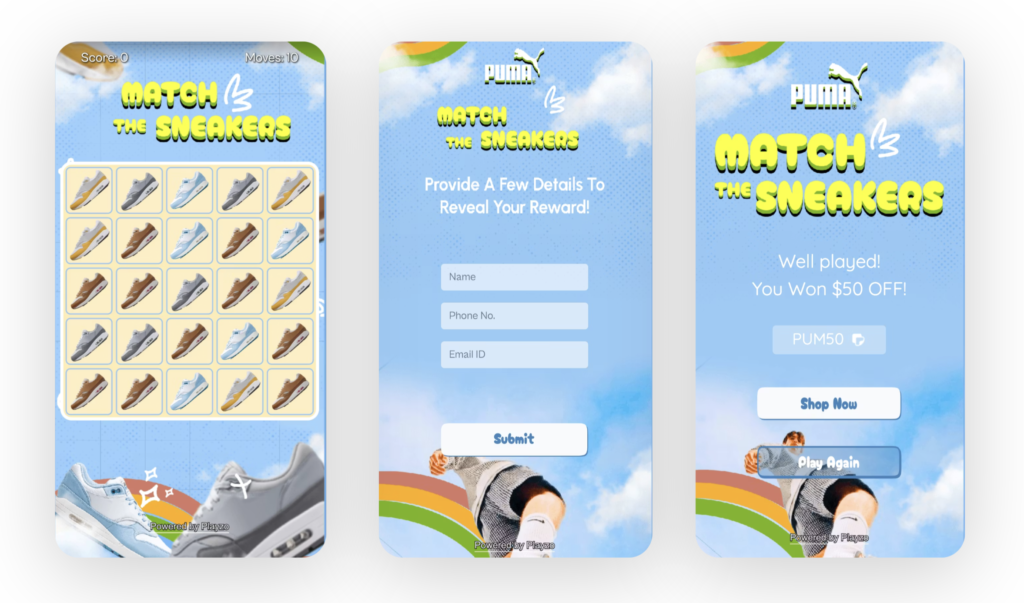Summary: Gamification is the most effective way to collect first-party data from anonymous users. Personality quizzes reveal customer preferences and behaviors, while luck-based and arcade games naturally collect email addresses through reward mechanics. This approach increases data collection rates by 3x compared to traditional forms.
Table of Contents
- Why Gamification is Perfect for First-Party Data Collection
- Personality Quizzes: The Data Goldmine
- Luck-Based & Arcade Games: Email Collection Powerhouses
- Implementation Strategies for Maximum Data Collection
- Real-World Success Stories
- Getting Started with Playzo
- Frequently Asked Questions
In today’s privacy-first world, first-party data has become the most valuable asset for businesses. With third-party cookies disappearing and privacy regulations tightening, companies need innovative ways to collect customer data directly. Gamification emerges as the perfect solution, offering engaging experiences that naturally encourage users to share their information.
Featured Snippet Answer: The most effective gamification strategies for first-party data collection include personality quizzes (which reveal customer preferences and behaviors) and luck-based/arcade games (which collect email addresses through reward mechanics). These approaches increase data collection rates by 3x compared to traditional forms while providing engaging user experiences.
Why Gamification is Perfect for First-Party Data Collection
Traditional data collection methods face significant challenges: intrusive popups that users hate, low conversion rates, and increasing privacy concerns. Gamification solves these problems by creating value exchange – users get entertainment and rewards in return for their information.
People Also Ask: How does gamification help collect first-party data? Gamification helps collect first-party data by creating engaging experiences that users willingly participate in, making them more likely to share personal information in exchange for game rewards, personalized results, or exclusive content.
The Data Collection Advantage
- 3x higher email collection rates compared to traditional forms
- 90% of Gen Z and Millennials engage with games
- Average 2m 49s engagement time increases data quality
- Users willingly share preferences and behaviors
- Natural progression from anonymous to identified users
Personality or Product Recommendation Quizzes: The Data Goldmine
Personality Style or Product Recommendation quizzes are among the most powerful tools for first-party data collection. They tap into users’ natural curiosity about themselves while gathering valuable insights about their preferences, behaviors, and characteristics.
What Makes Personality Quizzes So Effective
Intrinsic Motivation: Users are naturally curious about their personality traits, preferences, and how they compare to others. This curiosity drives them to complete quizzes and share information willingly.
Personalized Results: Quizzes can provide personalized insights that users find valuable, creating a strong incentive to provide accurate information in exchange for meaningful results.
Social Sharing: Personality quiz results are highly shareable, creating viral potential while collecting data from users who share their results.

Types of Data You Can Collect Through Personality Quizzes
- Demographic Information: Age, gender, location, occupation
- Preferences: Product preferences, lifestyle choices, interests
- Behavioral Insights: Shopping habits, decision-making patterns
- Psychographic Data: Values, attitudes, personality traits
- Contact Information: Email addresses, phone numbers
Real Example: Fashion Brand Personality Quiz
A major fashion retailer created a “What’s Your Style Personality?” quiz that asked users about their lifestyle, preferences, and fashion choices. The quiz collected:
- Email addresses (85% completion rate)
- Style preferences and color choices
- Shopping frequency and budget ranges
- Lifestyle and activity preferences
- Social media sharing (40% shared results)
Results: 3x higher data collection compared to traditional signup forms, with 60% of users providing detailed preference information that enabled highly targeted marketing campaigns.
Luck-Based & Arcade Games: Email Collection Powerhouses
Luck-based and arcade games excel at converting anonymous users into identified leads. The thrill of winning and the desire to save progress naturally encourages users to provide their email addresses.
Why Luck-Based Games Work for Data Collection
Instant Gratification: Games like spin the wheel, scratch cards, and slot machines provide immediate excitement and rewards, making users more willing to share information.
Progress Saving: Users want to save their scores, unlock rewards, and track their achievements, creating a natural incentive to provide email addresses.
Reward Redemption: Games often offer prizes or discounts that require email verification, making data collection feel like a natural part of the reward process.

Arcade Games: The Engagement Multiplier
Arcade games like whack-a-mole, match-3 games, and doodle jump create addictive experiences that keep users engaged longer, increasing the likelihood of data collection.
High Engagement: Arcade games typically have 2-4 minute average play times, giving users enough time to become invested in the experience and more likely to provide information.
Competitive Element: Leaderboards and score comparisons encourage users to create accounts and share their achievements.

Data Collection Strategies for Games
- Email Gates: Require email to save high scores or unlock premium features
- Reward Redemption: Offer prizes that require email verification
- Progress Tracking: Allow users to save game progress with email accounts
- Social Features: Enable sharing and competition through email signup
- Exclusive Content: Provide bonus levels or features for registered users
Real Example: E-commerce Spin Wheel Campaign
An online retailer implemented a spin-the-wheel game offering discounts and free shipping. The game collected:
- Email addresses (78% of players)
- Discount preferences and spending habits
- Product category interests
- Purchase intent signals
Results: 4x higher email collection compared to popup forms, with 45% of collected emails converting to purchases within 30 days.
Implementation Strategies for Maximum Data Collection
1. Progressive Data Collection
Start with minimal information and gradually collect more data as users become more engaged:
- Level 1: Email address for basic game access
- Level 2: Name and preferences for personalized experiences
- Level 3: Detailed profile information for advanced features
2. Value Exchange Strategy
Always provide clear value in exchange for data:
- For Email: Game progress saving, exclusive rewards, personalized results
- For Preferences: Customized game experiences, targeted recommendations
- For Detailed Info: Premium features, exclusive content, personalized offers
3. Timing and Placement
Collect data at the optimal moments:
- After Engagement: Once users are invested in the experience
- Before Rewards: When users are motivated to receive benefits
- During Peak Interest: When users are most engaged and excited
4. Privacy-First Approach
Build trust through transparent data practices:
- Clearly explain why you need the information
- Show how the data will be used
- Provide easy opt-out options
- Follow GDPR and privacy regulations
Real-World Success Stories
Banking Industry: A major bank used personality quizzes to understand customer financial behaviors and preferences. The result? 400% increase in financial education engagement and 60% improvement in product recommendation accuracy.
E-commerce Success: An online retailer replaced popup forms with a scratch card game. They collected more qualified leads in one day than they had in the previous week, with 3x higher conversion rates and 25% higher average order values.
Fashion Brand: A clothing retailer implemented a style personality quiz combined with a spin wheel for discounts. The campaign generated 4-minute average engagement time, 40% lead capture rate, and 22% sales lift within the first month.
Getting Started with Playzo
Playzo makes it incredibly easy to implement first-party data collection through gamification. With AI-powered quiz generation, 50+ game templates, and built-in analytics, you can:
- Create personality quizzes with AI-generated questions
- Deploy luck-based games for email collection
- Build arcade games for high engagement
- Track detailed analytics on data collection and user behavior
- Customize games to match your brand and data collection goals
Ready to Transform Your Data Collection Strategy?
Join thousands of businesses who are already using gamification to collect valuable first-party data while creating engaging customer experiences. Start your Playzo journey today and see why gamification is the future of data collection.
No coding required. GDPR compliant. Results guaranteed.
Conclusion
First-party data collection through gamification represents a paradigm shift from intrusive forms to engaging experiences. By leveraging personality quizzes and luck-based/arcade games, businesses can collect valuable customer insights while providing entertainment and value.
The key to success lies in creating genuine value exchange – users get engaging experiences, personalized results, and rewards in return for their information. This approach not only increases data collection rates by 3x but also improves data quality and customer relationships.
As privacy regulations continue to evolve and third-party data becomes less reliable, gamification offers a sustainable, engaging, and effective solution for first-party data collection. The businesses that implement these strategies today will have a significant competitive advantage in the privacy-first future.
Ready to get started? Explore Playzo‘s game library and discover how easy it is to create engaging experiences that collect valuable first-party data.
Frequently Asked Questions
What types of first-party data can I collect through gamification?
Through gamification, you can collect email addresses, demographic information, preferences, behavioral insights, psychographic data, and contact information. Personality quizzes are particularly effective for collecting detailed preference and behavioral data, while games excel at collecting email addresses and basic contact information.
How much more effective is gamification for data collection compared to traditional forms?
Gamification typically increases data collection rates by 3x compared to traditional popup forms. Personality quizzes can achieve 85% completion rates, while luck-based games collect email addresses from 78% of players. The key is providing value in exchange for information.
Are personality quizzes better than games for collecting detailed customer data?
Personality quizzes are superior for collecting detailed preferences, behaviors, and psychographic data because users are motivated to provide accurate information for personalized results. Games are better for collecting email addresses and basic contact information through reward mechanics.
How do I ensure GDPR compliance when collecting data through gamification?
Ensure GDPR compliance by clearly explaining data usage, providing easy opt-out options, implementing transparent privacy policies, and only collecting necessary data. Playzo’s platform includes built-in GDPR compliance features and privacy controls.
What’s the best timing for requesting data in gamification experiences?
The best timing is after users are engaged and invested in the experience, typically after 30-60 seconds of gameplay or quiz completion. Request data when users are motivated to receive rewards, save progress, or access personalized results.
Can I use gamification for B2B data collection as well?
Yes, gamification works excellently for B2B data collection. Professional personality assessments, industry-specific quizzes, and business-focused games can collect company information, job roles, industry preferences, and professional contact details while providing value to business users.